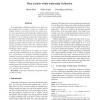Free Online Productivity Tools
i2Speak
i2Symbol
i2OCR
iTex2Img
iWeb2Print
iWeb2Shot
i2Type
iPdf2Split
iPdf2Merge
i2Bopomofo
i2Arabic
i2Style
i2Image
i2PDF
iLatex2Rtf
Sci2ools
108
click to vote
DEXAW
2008
IEEE
2008
IEEE
Meta Analysis within Authorship Verification
In an authorship verification problem one is given writing examples from an author A, and one is asked to determine whether or not each text in fact was written by A. In a more general form of the authorship verification problem one is given a single document d only, and the question is whether or not d contains sections from other authors. The heart of authorship verification is the quantization of an author's writing style along with an outlier analysis to identify anomalies. Human readers are well-versed in detecting such spurious sections since they combine a highlydeveloped sense for wording with context-dependent meta knowledge in their analysis. The intention of this paper is to compile an overview of the algorithmic building blocks for authorship verification. In particular, we introduce authorship verification problems as decision problems, discuss possibilities for the use of meta knowledge, and apply meta analysis to postprocess unreliable style analysis results. Our m...
Authorship Verification | Authorship Verification Problems | Database | DEXAW 2008 | Meta Knowledge |
| Added | 19 Oct 2010 |
| Updated | 19 Oct 2010 |
| Type | Conference |
| Year | 2008 |
| Where | DEXAW |
| Authors | Benno Stein, Nedim Lipka, Sven Meyer zu Eissen |
Comments (0)

